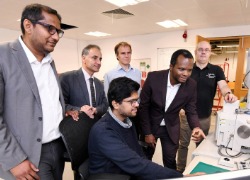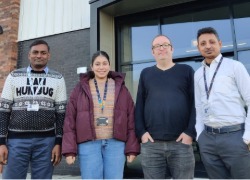Worrying needlessly?
A generation ago we all relied on our own sense of well-being as reassurance that we were in good health. But now an increasing reliance on health screening could be making us ill with worry. Alison Utley reports.
As a means of picking up signs of cancer or other serious illness – hopefully in time to make treatment more effective – health screening can be a lifesaver, literally. And for many people, a normal result is a welcome reassurance, one less thing to worry about.
But increasingly, with the huge technological advances taking place in medical science, screening results can highlight potential anomalies in our bodies, many of which are completely harmless. Nevertheless, the message that your results are ‘outside the normal range but probably nothing to worry about’ creates a level of anxiety about our bodies which is unhealthy.
Sociology professor Eileen Green, is researching the impact of screening – which she believes is now becoming so routine that many of us are starting to think of our own bodies as something ‘risky’, to be endlessly checked and measured against some false notion of a normal body. Midlife women in particular are subject to a huge range of screening checks, for breast cancer, cervical cancer and bone density for example. But despite hoping for precision, women often find the results very complicated, consisting of ‘population-based risks’ which can raise many more questions than they can answer.
Such over-medicalisation, of women’s bodies in particular, is likely to lead to problems. ‘I am concerned we are starting to lose confidence in our own bodies’, said Professor Green. ‘What we tend to forget is that risk factors are pointers to a potential, unformed eventuality. But they are interpreted as certainties – by women and by health professionals!’
Professor Green, Director of the Centre for Social and Policy Research at the University of Teesside, has been working with Dr Frances Griffiths, a clinician and sociologist at Warwick University, as part of a large study of innovative health technologies and their impact on women. The research, funded by the Economic and Social Research Council, has involved interviews with almost 100 women and 58 health-care workers – including doctors, nurses and radiographers.
Many clinical consultations were recorded and painstakingly analysed, and the researchers uncovered a great deal of concern about the interpretation of results amongst both patients and doctors.
The results of the study indicate that screening is increasingly blurring the boundaries between the healthy and the diseased, categories which have become subsumed under a more general category of 'risk factors' that can point to some future health problem. However, many women in the study – and the majority of doctors – seemed to think the advent of screening was a positive development. This was a typical comment from a 62-yearold woman, 'For me it's been brilliant, it sort of stops something getting worse. I think it is a very effective service'.
It was the actual experience of getting the results which was often very negative, Professor Green found. Being given a statistical probability of your chances of suffering from, say, osteoporosis at some point in the future is a confusing and often meaningless process which can simply result in needless worry. ‘The wish for certainty from technology for reassurance – while understandable – is unrealistic’, Professor Green said.
The analysis indicated clinical consultations became too focused on ‘where I am’ on the graph of possible outcomes. On hearing the term ‘risk factor’, women seemed to conclude that this particular health problem will affect them personally, rather than being a statistical probability.
‘The old fashioned idea of relying on how you are feeling is being downgraded by technologies which almost seem to be assuming their own voice during medical consultations. We are in danger of over-interpreting the results and regarding them as the future of how we manage our health – whereas in fact they are just one element of modern health care.’
Many women in the study simply came away with the idea they were abnormal and had something wrong with them, even when they were told there was nothing to worry about, Professor Green said. ‘Screening is creating an artificial fragmentation of our bodies which encourages us to think of ourselves as different bits that can go wrong rather than seeing ourselves more holistically.’
One woman articulated the anxiety of many, ‘I really cannot tell you why I’ve missed the appointment … at the back of my mind is that I don’t want to find anything else wrong with me’.
There are important lessons to be learned, according to Professor Green, about the way results are communicated, and about the place and value of technology in looking after our health. For the picture according to the research findings is currently very patchy.
Another woman said, ‘the first person I spoke to was my GP, she was so easy to talk to and very understanding … But some health professionals … when I went to the hospital for testing … it was a man and, and he was very dismissive’.
For Professor Green, it is important to recognise and debate the fact that technology is providing us all with more information than we can understand at the moment. ‘We need to start putting technology in its rightful place rather than assuming it can solve everything’, she said. ‘The results must be treated with more caution.’
 Teesside University and Saturn Turbo Services partnership to
...
Teesside University and Saturn Turbo Services partnership to
... Groundbreaking project to unlock nuclear energy's role in
...
Groundbreaking project to unlock nuclear energy's role in
... Start the new year by expanding your knowledge
Start the new year by expanding your knowledge